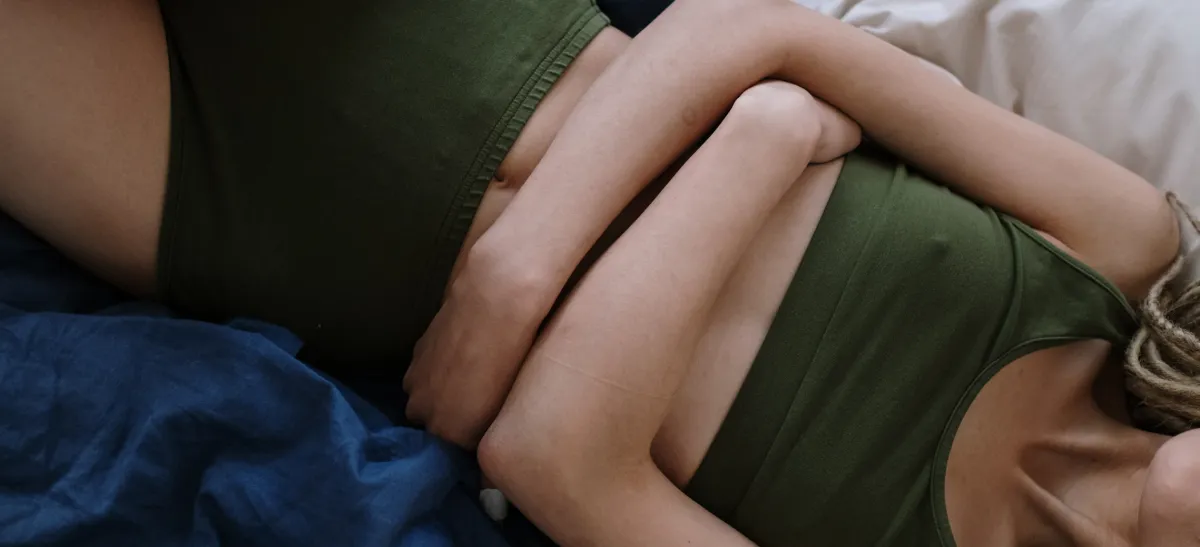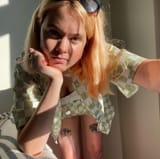At 25, I’m Considering Freezing my Eggs Because of my Endometriosis, But the Odds Are Against Me
Facing yet another devastating diagnosis, I am now forced to make long term decisions I wish I didn’t have to make so soon.

Access the Audio Read version of this article directly on Spotify for Podcasters.
"There is always the niggle in the back of my mind. It'll be worth it in the end, when you’ve got a family of your own. Small humans to love and nurture, proof that life can persist through sickness."
Late on a Friday evening in December, I lay on my mother’s lap in her living room and sob. She strokes my hair like she has since I was small, smoothing my roots and telling me it will all work out. She knows as well as I do that it is more complicated than that, but for now I need the comfort. There has been a barrage of bad news recently, from declining physical health to losing our beloved gran, and now a doctor’s call to announce that although I was cut open only last spring, my endometriosis has returned at a rapid rate, and another surgery must be scheduled.
I am sick of being an object on a hospital bed, of being prodded and poked and dissected for disease. I want to refuse more treatment. Enough is enough, I think. But there is always the niggle in the back of my mind. It'll be worth it in the end, when you’ve got a family of your own. Small humans to love and nurture, proof that life can persist through sickness.
I live with endometriosis, a full body inflammatory condition that causes tissue, similar to the lining of my womb, to grow on different organs in the body. So far, I have found it all over my pelvis, stomach, bowel, and ovaries. Now, another endometrial cyst has grown on my ovary, only this time it’s larger than a golf ball and my surgeon isn’t sure she can save the infected ovary. One less ovary means my chances of pregnancy are theoretically halved.
From the moment I heard my endometriosis diagnosis, I thought about kids. It is an ache I have always had. I spent years working with children, playing house as a nanny, teaching them in classrooms, tutoring them through lockdowns. I kept kids in close proximity even after I became sick, some sort of fallback mechanism to remind me of a future where I can mother my own. My life isn’t set up for children yet. I love my partner but we are far from financially stable, both starting out in notoriously difficult industries; academia for him, writing for me, but still we know, my time is running out. Not in the old fashioned sense of career progression, or fear of the planet on fire. Society seems to have accepted people wanting children later in life than before, but as my own endometriosis seems to reoccur so aggressively, time is against us.
Sarah Jane, an Irish blogger, was also 25 when she was finally diagnosed with endometriosis after over ten years of looking for answers. Almost immediately, she was told her fertility would be affected, and took it upon herself to research the next steps. As with so much of endometriosis, the research is sparse and the misinformation widespread, so deciding what and how to understand your own fertility, whilst living with the chronic pain and illness the disease causes, is exhausting.
On the day I speak to Sarah Jane, she has just found out that she can begin the injections required to increase her egg count as the first stage of her own egg freezing journey. “We won't know how my body will react and if this will actually work or if it will take a couple of turns,” she says. That is the most isolating part, the coping with uncertainty that endometriosis brings: we do not know how our specific bodies will react to a fertility treatment, or how much disease they will find until we awake from a surgery, or how complicated our pregnancies may be until we start carrying. It is that not knowing that perhaps singles out endometriosis-related infertility.
Hysterectomies are not cures for endometriosis, although many doctors might tell you otherwise. However, people with endo often opt for an hysterectomy in an attempt to stop some of their worst symptoms. All of the women I interviewed to write this piece told me it was something they have considered.
“My extremely heavy periods affect my quality of life, so I've been considering a hysterectomy,” says Christina, 27, who lives with stage 4 endometriosis. “It’s not a solution for endo itself, but would help with the bleeding disorder.” As for myself, I am not too sure whether we are unduly influenced by the old belief that a hysterectomy is a cure, or if the idea of removing something so closely associated with our chronic pain would relieve some mental anguish, if not physical.
It is well documented that the timeline for having children has been pushed back. In England, the average age of a first time mother is 29 and we know those statistics flatten the trends for social class and urban centres, with 63% of mothers in London having children after 30, according to Business Insider. Sarah Jane, who’s 28, says her timeline for her twenties has been disrupted: before her diagnosis she thought children would be something she waited for. “I had planned to maybe start at 32 or so, but my boyfriend and I are maybe thinking 30 might be better,” she says. Two years doesn’t sound so long in the scheme of our lives, but it is the removal of choice that feels so unfair at times. Christine echoes those feelings. “It’s a conversation that [my partner and I] frequently have,” she says. “It feels like a big question mark in our future. Are we ready to do this soon? Will we even be able to have the experiences that other birth parents do? Do we need to start planning for IVF or even look into adoption? It's a lot to think about and face on top of navigating endometriosis in other ways.”
Zaina Mahmoud of the London Women's Clinic tells me that although it seems daunting, it is vital endo sufferers are presented with choices soon after diagnosis. “You should be counselled about reproductive planning, including the possibility of decreased ovarian reserve and the risks of delayed childbearing, early on,” she says. “Younger patients planning for surgery due to pain or any other reason absolutely should be given the option of fertility preservation. Endometriosis is a progressive condition, so the sooner that’s done, the better.”
But what if you aren’t, or aren’t ready to be, in a relationship? To think about fertility whilst you’re single feels almost counter-intuitive if you imagine your future with a long-term partner first. Sarah, 24, single but living with endo, says it is unavoidable now that she has been told her own endometriosis means she will not conceive naturally. “I’ll have to do IVF regardless, but given I'm single, I’m kind of just avoiding thinking about it,” she says. “But if it wasn’t for endo, I would never have had to think about it at all”.
It may seem like there are multiple options available for those who are facing infertility, endometriosis-related or not, but personal circumstances impact those, narrowing choices further. Conversations around adoption, its red tape, the ethical implications of international processes and the discrimation faced by certain families, whether they are disabled or queer, all present dilemnas. Sarah says her own cultural religious upbringing makes IVF one of the only viable chances. “In my culture and religion, you have to be married before kids, and things like surrogacy or using a sperm or egg donor aren’t allowed,” she says. “If I had those options, I wouldn’t worry as much, but if IVF doesn’t work then the only other option I have is adoption”.
However, we must also reckon with the low success rates of so many of these fertility interventions, not to mention the prohibitive costs. New research by the British Fertility Society suggests egg freezing has less than a 20% success rate, with the Human Fertilisation & Embryology Authority reporting that rate is 32% for IVF generally. In the UK, some IVF procedures are covered by the NHS in certain circumstances, and it seems a postcode lottery decides how many rounds you are entitled to. Outside of free healthcare, it can cost up to £5,000 per IVF cycle, and £4,000 for the freezing process alone. Do I want to go through more medical interventions, drain my savings and tire my body, to be left heartbroken in the end? The odds are so clearly stacked against me, but that does nothing to quell the desire to be pregnant, and so it is likely I will still participate in the fertility roulette, and hope that it will, indeed, “all work out in the end”.
*This article is for informational purposes only and is not a substitute for professional medical advice or treatment. Always seek the advice of qualified health providers.





